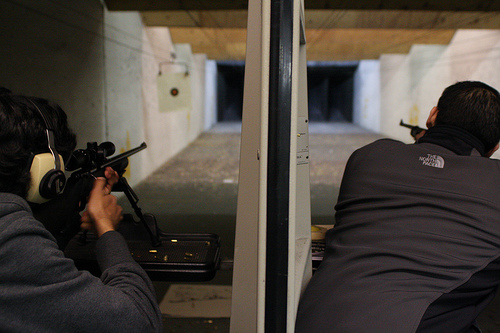POSTED BY NMCOMPASS ⋅ FEBRUARY 5, 2013 ⋅ 3 COMMENTS
Photo Credit: Anuj Biyani via Compfight cc
By Alex Escué Limkin — Having been thrown out of the Navy for fighting with a Marine in defense of the 3rd US Infantry Regiment (The Old Guard), I understand interservice rivalry as well as anyone. Still, the Feb. 2 story out of Texas—in which a veteran Navy sniper and another veteran were shot and killed by an ex-Marine at a shooting range—took me by surprise.
Much is known about the deceased, Chris Kyle, author of the best-selling book, American Sniper. But little is known about his alleged killer other than that he fled the scene in Kyle’s truck, was considered “armed and dangerous,” and shortly thereafter was taken into custody. His ID revealed him to be one Eddie Ray Routh out of Lancaster.
What grabbed my attention was not the obvious irony of someone being shot to death at a firing range, but that at the time of the shooting, Chris Kyle was at the firing range ”helping another soldier who was recovering from post traumatic stress syndrome.” It’s preposterous that anyone suffering from PTSD can be helped by anything that occurs at a firing range. As a veteran dealing with PTSD, I can think of no worse place to be than at a firing range. Just the racket alone would cornhole your mind.
But this isn’t the first time I have heard of attempts to treat PTSD with additional servings of war “drama.” The Department of Veterans Affairs has been attempting to treat PTSD by placing vets in realistic war-game simulators for years, a course of treatment I declined because it sounded like torture. (In fact, Rep. Dianne Miller Hamilton is seeking a quarter-million dollars from the state for a New Mexico version of this virtual reality program.)
What eventually helped me was getting away from guns and violence, and turning to nature and writing for comfort and healing. I attended Outward Bound courses for veterans offered at no charge in the wilderness areas of the San Juan Islands of Washington and the Sawatch Mountains of Colorado and the lazy rivers of Alabama. I spent long days with a special horse named Promise in the Sangre de Christos with Listening Horse Therapeutic Riding. And I attended a veteran writing and meditation workshop with Maxine Hong Kingston at Ala Kukui.
There is always the possibility that my experience of PTSD is an aberration, and that reintroducing afflicted veterans to the sights, sounds and atmosphere of war could be beneficial for them in a way I just can’t grasp. Just like the answer to our school shootings could very well be arming teachers, principals, janitors, librarians, nurses, paramedics, bus drivers, postal workers etc. etc. etc.
A news release from Travis Cox, director of FITCO Cares, a nonprofit organization the sniper helped start, reads in part: “Chris died doing what he filled his heart with passion—serving soldiers struggling with the fight to overcome PTSD.”
Tragically, the soldier being treated for PTSD at the firing range was none other than Eddie Ray Routh. Which begs the question of whether our national tendency to treat violence with violence should be reexamined.
******
Author Alex Escué Limkin is forming an action and advocacy team, DVR-6, specializing in the recovery and aid of homicidal or suicidal veterans in the backcountry. He blogs about his experience as an Iraq veteran atwarriorswithwesthusing.org.


I couldn’t disagree with this more “It’s preposterous that anyone suffering from PTSD can be helped by anything that occurs at a firing range.” – I know several vets who found great therapy in going back to firing ranges and re-training themselves to realize that they can be in a safe environment with and even causing that noise. Perhaps you need to get therapy.
POSTED BY MAE STORME | FEBRUARY 5, 2013, 3:48 PM
Mae – even if you said you knew millions of veterans who receive “great therapy in going back to firing ranges”, I would remain skeptical of this type of treatment. This latest tragedy does little to change my opinion.
POSTED BY ALEX LIMKIN | FEBRUARY 7, 2013, 3:42 PM
A compassionate approach to PTSD, whether from war experiences or other experiences of violence and violation, makes the most sense to me. One only has to look at the healing transformation described by Vietnam veterans participating in Thích Nhất Hạnh teachings or the long, sensitive recovery from ritualistic sexual abuse experienced by my friend at the hands of her parents during her childhood to recognize that subjecting someone suffering from PTSD to his or her triggers makes as little sense as arming school staff against the possibility of berserk shootings.
POSTED BY VICKI GOTTLIEB | FEBRUARY 5, 2013, 7:13 PM